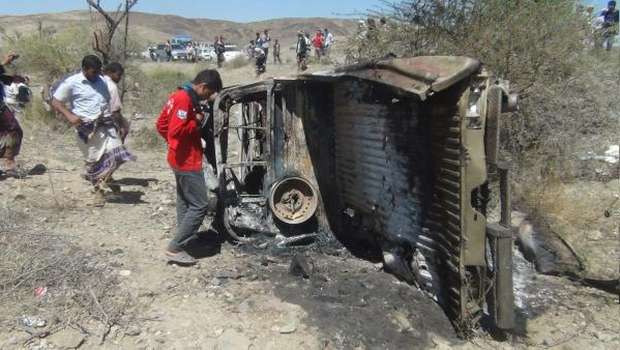
People inspect the wreckage of a car hit by an air strike in the central Yemeni province of al-Bayda April 19, 2014. (Reuters/Stringer)
The latest, on Sunday morning, reportedly struck a column of four vehicles carrying armed insurgents in the Abyan governorate, killing several. The BBC’s Arabic news website quoted security sources as saying the attack took place in the Mahfad area of Abyan, and resulted in dozens being killed and many injured.
Meanwhile, a Yemeni official said at least 12 people thought to be members of Al-Qaeda were killed in another drone attack on their vehicles in the Bayda governorate in central Yemen on Saturday, together with a smaller number of bystanders.
The director of security in the Bayda governorate, Brig. Gen. Adel Al-Asbahi, told Asharq Al-Awsat: “Members of Al-Qaeda were travelling in two vehicles in the Sawmaah area coming from Hadhramaut, and all were killed.” The attack also killed three civilians and wounded five others, who were in the vicinity of the targeted vehicles.
Asbahi said the security forces were still investigating the identity of the dead, after finding a number of ID cards. He said initial information indicated that all the dead were Yemeni nationals, from the Shabwah and Dalea governorates, near Bayda.
Asbahi said he expected a revenge attack by Al-Qaeda in response to the operation. He said: “We are in a state of high security alert, and we are expecting a response from them at any time, just as they did previously.”
Tribal sources told Reuters that they noted the presence of drones in the area in the last few days. They said the drone bombed the two vehicles early on Saturday morning, and that Al-Qaeda suspects were inside the two vehicles, with three civilians in a nearby car also killed.
The strike followed a number of Al-Qaeda attacks in Bayda in the last two weeks, including the assassination of the deputy governor, Brig. Gen. Hussein Dayan, as well as killing a soldier and injuring three others in ambushes laid for the army and security forces.
Bayda governorate, almost 170 miles (around 270 kilometers) southeast of the capital Sana’a, has been used as a base by Al-Qaeda-affiliated militants because of its rugged, mountainous terrain, which makes it difficult for the security forces to pursue them.
A security source, speaking on condition of anonymity, said the attack was carried out by an American drone, while an eyewitness said two different drones carried out the attack, each hitting the two vehicles separately with air-to-surface missiles.
Yemeni politicians and human rights activists condemned the continued use of armed drones, which have killed dozens of civilians in strikes across Yemen. The secretary-general of the Salafist Al-Rashad Party, Abdul-Wahab Al-Humaiqani, said the drone attack was a “crime which killed innocent people in cold blood.”
He added in a statement published on the party’s Facebook page that “whatever justification is given for what these drones are doing, they are lawless and baseless crimes and murders,” adding that the operation was “similar to the attacks by insurgents which target Yemeni soldiers and civilians.”
Humaiqani, who has been placed on Washington’s list of “Specially Designated Global Terrorists,” demanded that “everyone involved in these crimes must be punished, because they are crimes against national and international laws.”
The Yemeni parliament ratified a ban on drone attacks in December 2013, in response to mounting public anger at the growing number of civilian casualties, including the deaths of 17 people at a wedding party in the Bayda governorate in 2013.
The United States has stepped up its drone attacks as part of a campaign against the Al-Qaeda in the Arabian Peninsula (AQAP), which is based in Yemen and which Washington views as one of Al-Qaeda’s most dangerous wings.
The US government has admitted the use of armed drones in Yemen and other countries, although official spokesmen refuse to comment on specific operations.
In a related issue, the Ansar Al-Shari’a militant group, which is linked to Al-Qaeda, recently threatened to attack Popular Committees in Yemen’s Southern Governorates. The group published a press statement in which it accused members of the Popular Committees—tribal groups that fight alongside the regular military—of being servants of foreign powers.
Ansar Al-Shari’a, which controlled the Abyan and Shabwah governorates before it was defeated by the army with the help of the Popular Committees in 2011, added: “We will fight anyone who joins these committees or supports them and we will target them and target their interests, and pursue them whoever they are, wherever they are, and wherever they go.”
Meanwhile, the Interior Ministry revealed the identity of one of those killed in the recent attack on the Fourth Military Region headquarters in the town of Al-Tawahi in the Aden governorate earlier this month.
On its official website the ministry identified the attacker as Yahia Youssef Hamad, 26, from Bayt Harran in the Lahij governorate.
The ministry added that Hamad was among those who had escaped from the Central Prison in Sana’a, when 21 prisoners from the group escaped during an armed attack on the facility in February, including senior leaders of militant groups and explosives experts.
